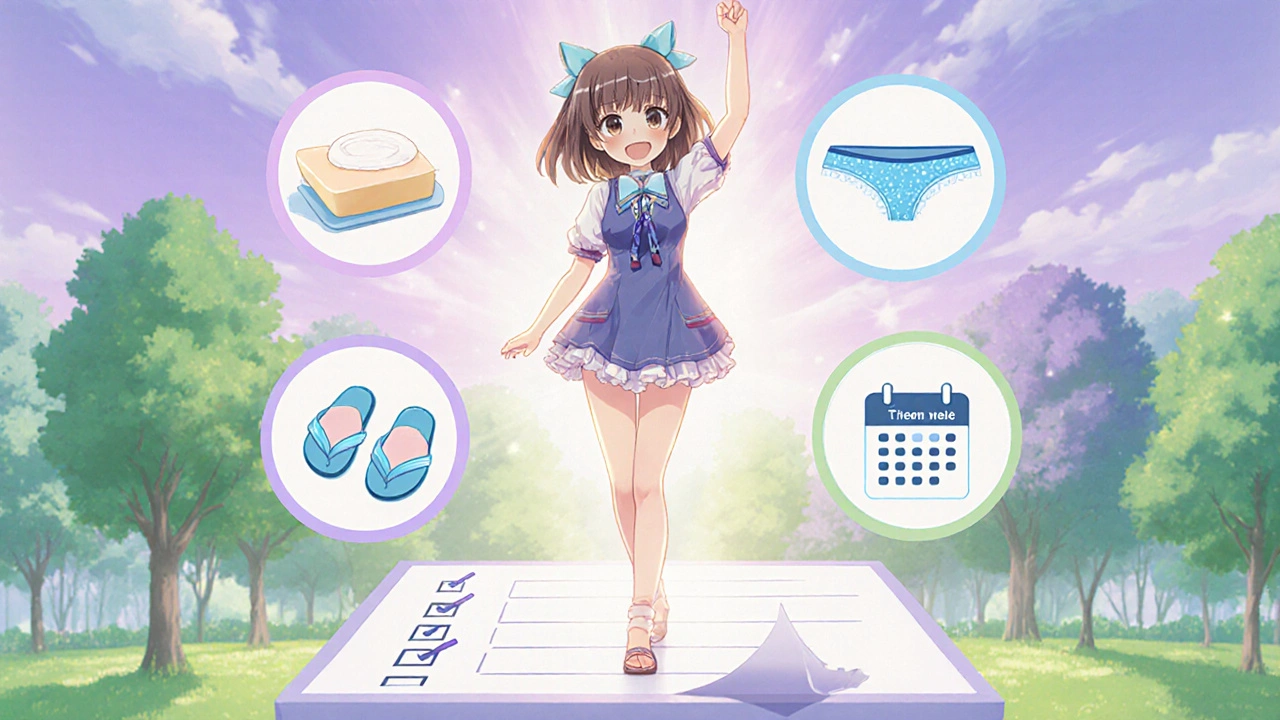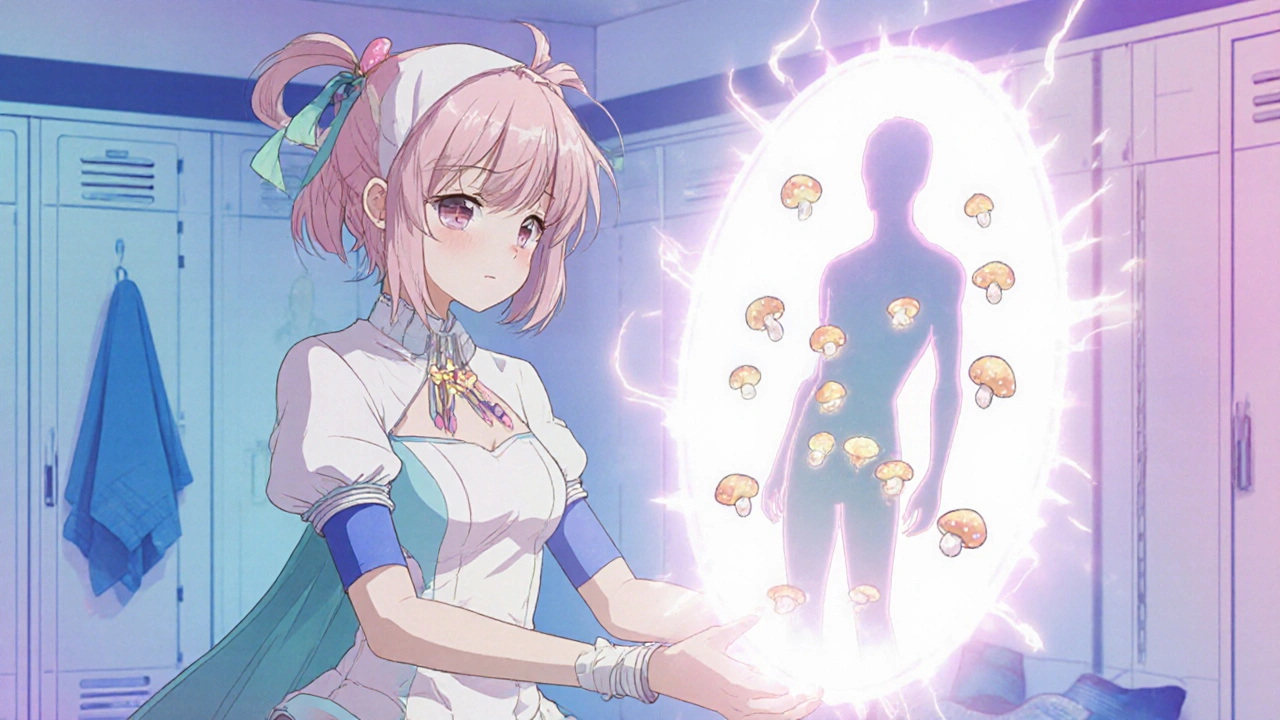When you hear that an itch down there might be contagious, you probably picture a cartoon germ spreading through the air. The reality of Jock itch (tinea cruris) is far less dramatic but still worth understanding. Knowing whether it spreads, how it does, and what you can do to stop it can save you embarrassment, unnecessary doctor visits, and a lot of uncomfortable skin.
Key Takeaways
- Jock itch is caused by dermatophyte fungus, not a virus.
- It spreads mainly through direct skin‑to‑skin contact or shared, damp surfaces.
- Good hygiene, keeping the area dry, and avoiding contaminated gear are the most effective prevention steps.
- Topical antifungal cream clears most cases within a few weeks.
- Myths about airborne transmission and "catching" jock itch from pets are unfounded.
What Exactly Is Jock Itch?
Jock itch, medically known as tinea cruris, is a superficial fungal infection that loves warm, moist skin folds. The fungi most often responsible belong to the dermatophyte family, especially Trichophyton rubrum and Epidermophyton floccosum. These organisms also cause athlete’s foot and ringworm, so you may have seen them in other parts of the body.
How Contagious Is Jock Itch?
Unlike the flu, jock itch contagious is not airborne. The fungus spreads when it moves from one skin surface to another that’s warm and damp. The most common routes are:
- Direct skin‑to‑skin contact, such as during sports or close physical activities.
- Indirect contact via towels, clothing, or equipment that hasn’t been properly dried.
- Shared public spaces like locker‑room benches, showers, or swimming pool decks where moisture lingers.
If you avoid these pathways, the chance of passing the infection to someone else drops dramatically.
Who’s Most at Risk?
Anyone can develop jock itch, but certain groups see higher rates:
- Male athletes who wear tight, synthetic gear that traps sweat.
- People living in hot, humid climates.
- Individuals with compromised immunity or diabetes, where skin healing is slower.
- Those who already have other fungal infections, like athlete’s foot or ringworm, because the same fungus can migrate.

Preventing the Spread
Prevention is a mix of hygiene, moisture control, and smart gear choices. Below is a quick‑reference table that sums up the main transmission routes and the best countermeasures.
| Transmission Route | Prevention Strategy |
|---|---|
| Direct skin‑to‑skin contact | Wear breathable, moisture‑wicking underwear; avoid sharing towels. |
| Contaminated clothing or equipment | Wash gym clothes after each use; dry shoes and socks thoroughly. |
| Public damp surfaces | Use shower sandals; wipe down bench areas with a disinfectant wipe. |
| Excessive moisture | Apply talc or antifungal powder to the groin area after showering. |
Effective Treatment Options
Most cases clear up with over‑the‑counter antifungal cream containing clotrimazole, terbinafine, or miconazole. Apply twice daily for two weeks, even if symptoms disappear earlier, to ensure the fungus is fully eradicated.
For stubborn infections, a short course of oral antifungal medication may be prescribed by a clinician. Keep the area clean, dry, and loosely clothed throughout treatment to prevent re‑infection.
Common Myths About Jock Itch
Myth #1: “You can catch it from a pet.”
The fungi that cause jock itch rarely live on animals, so pets are not a source.
Myth #2: “If I’m not itchy, I’m fine.”
You can have an early infection without noticeable itch. A visual rash or redness is enough to start treatment.
Myth #3: “Antibacterial soap will cure it.”
Since it’s a fungal infection, you need antifungal‑specific agents, not antibacterial products.

When to See a Healthcare Professional
If the rash spreads to the abdomen, thighs, or buttocks, or if you develop fever, swelling, or pus, schedule a visit. A doctor can confirm the diagnosis with a skin scraping and prescribe stronger medication if needed.
Quick Checklist for Managing Jock Itch
- Wash the affected area with mild soap and dry thoroughly.
- Apply antifungal cream as directed, usually for 2‑4 weeks.
- Change underwear daily; choose cotton or moisture‑wicking fabrics.
- Avoid sharing towels, razors, or clothing.
- Use shower sandals in communal areas.
- Monitor for spreading; seek medical help if it worsens.
Frequently Asked Questions
Can I catch jock itch from someone who doesn’t have visible symptoms?
Yes. The fungus can live on skin that looks normal, especially in the groin area. That’s why hygiene and avoiding shared damp items are crucial.
How long does it take for an infection to clear?
With proper topical treatment, most people see improvement in 3‑5 days, but the full course should be completed for 2‑4 weeks to prevent recurrence.
Is it safe to use the same towel after treating jock itch?
No. Towels can retain fungal spores. Wash them in hot water (≥60°C) after each use, or use a separate towel until the infection clears.
Can jock itch lead to other infections?
If the skin cracks, bacteria can enter, causing secondary infections. Keep the area moisturized yet dry to avoid cracking.
Do natural remedies like tea tree oil work?
Some studies show tea tree oil has antifungal properties, but concentrations vary. It can be an adjunct, but proven OTC creams are more reliable.

 Pharmacology
Pharmacology
Zachary Blackwell
October 23, 2025 AT 12:51Man, they don’t tell you that the big pharma giants actually want you to stay in the dark about jock itch because they profit from endless doctor visits. The fungus spreads on damp gear, sure, but the real infection is the system that keeps us guessing. Keep your underwear breathable and wash that gym bag like it’s a crime scene. And remember, the only thing more contagious than the itch is the fear they sell you.
prithi mallick
October 29, 2025 AT 15:26Hey, that’s a solid point – staying dry is key. Just take it step by step, keep a routine, and you’ll feel better soon.
Michaela Dixon
November 4, 2025 AT 19:01The intertwining of dermatophytic spores with the moist microclimate of the groin area creates a perfect storm for tinea cruris to flourish and proliferate unchecked if left unattended. When one considers the evolutionary adaptation of Trichophyton rubrum to thrive on keratinized tissue, the importance of barrier integrity becomes crystal clear without the need for excessive punctuation or convoluted clause structures. Moisture, warmth, and skin‑to‑skin proximity act as the triumvirate of conditions that fuel the relentless expansion of the fungal colony across the susceptible folds. A single misstep, such as neglecting to dry socks thoroughly, can initiate a cascade that leads to widespread erythema and pruritus that can dominate daily life. The literature repeatedly emphasizes that topical azole therapies, when applied consistently, infiltrate the hyphal walls, disrupting ergosterol synthesis, which is vital for cell membrane stability. However, the mere application without addressing the underlying environment, like lingering humidity, is akin to building a house on sand – the structure will ultimately collapse. Moreover, the cross‑contamination with athlete’s foot underscores the necessity for comprehensive antifungal regimens that target all potential reservoirs on the body. It is also noteworthy that while oral antifungals exist, their systemic distribution must be weighed against hepatic considerations, especially in individuals with pre‑existing conditions. The psychological burden, often under‑reported, can manifest as anxiety about intimacy and social interactions, further compounding the issue. Preventive measures, such as using talc or antifungal powders post‑shower, create an inhospitable surface for spore adherence, effectively reducing colony viability. In communal environments like locker rooms, the adoption of personal foot coverings acts as a barrier that not only protects the wearer but also minimizes the collective fungal load, thereby benefiting the entire community. The myth that pets are vectors is largely debunked, yet the persistence of misinformation highlights the need for continued public education. Finally, the role of proper garment hygiene, including the use of cotton or moisture‑wicking fabrics, cannot be overstated, as it fosters ventilation and moisture evaporation, thereby dismantling the conditions that nurture the fungus. In essence, the battle against jock itch is waged on two fronts: chemical eradication of the fungus and environmental modulation to prevent re‑colonization, a dual strategy that, when executed diligently, yields lasting remission.
Dan Danuts
November 10, 2025 AT 22:36Yo guys! Got this funky itch once before a big game and the coach’s tip saved me – dry the area with a quick shake‑dry after the shower and slap on some powder. Works like a charm and keeps the squad confident.
Dante Russello
November 17, 2025 AT 02:11Absolutely, Dan! It’s essential, especially after intense workouts, to switch into clean, breathable underwear, to allow air circulation, and to wash gym clothes in hot water, because those spores love lingering in damp fabrics, and using a dedicated foam sponge to scrub the locker bench can further reduce contamination, don’t forget to keep a small sachet of antifungal powder in your bag for quick application.
James Gray
November 23, 2025 AT 05:45Yo bro, just remember to keep it fresh – wash that gear daily, dry it good, and you’ll be fine. It’s not rocket science, it’s just common sense, and yeah it’ll definitely keep the itch away.
Danielle St. Marie
November 29, 2025 AT 09:20Only true patriots keep their locker rooms spotless 🇺🇸.
keerthi yeligay
December 5, 2025 AT 11:51Yes, that is correct! Clean spaces definitely reduce the risk – keep up the good work.